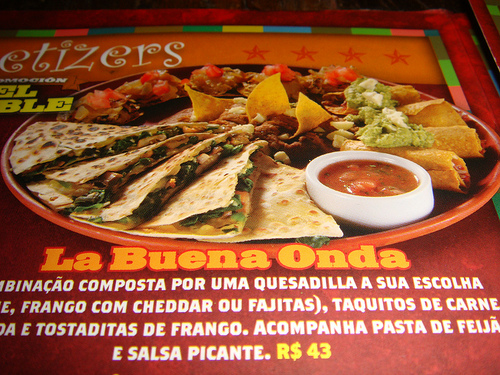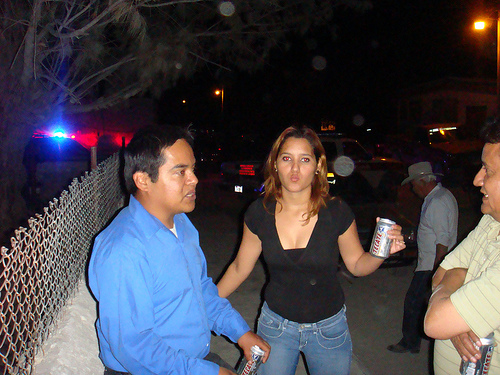Boludo
 |
| Unless you mean to insult, use boludo only with someone this close, if you must Photo credit: Alberto licensed CC BY 2.0 |
Obviously, this wretch was popularly thought of as someone having a lot of guts to step into what’s practically a suicide mission. Lot of guts translated into big balls or, in Spanish, boludo. So, basically, the term would stand for someone brave and courageous and thus has “big balls.” But then, another school of thought noted them as utter fools as there was no bravery involved in certain death. Hence, with time, this word came to carry this connotation.
Although, in the streets of Argentina, a boludo would generally be an immature jackass or a moron, it might not always be as offending as it seems. Most teenagers are often heard using this word amongst themselves as casual appelative. It often combines with che in one of the most common street expressions, “¡Che boludo!” This could mean, “Hey moron!” or “Hey buddy!” depending on the context.
At any cost, stay away from using this word unless you are in extremely casual and friendly settings as you never know how it might come across. Especially if you’re older than, say 30, an overuse of boludo might be taken as an attempt to play up a certain image or even cultural or lexical poverty. And if you’re feeling even more adventurous, there’s pelotudo; same meaning but a much bigger punch.
By the way, this word refers to a wealthy person in El Salvador! So, be careful if you’re traveling to both the countries.
Quilombo
 |
| Slums of La Boca: ¡Qué quilombo! Photo credit: Richie Diesterheft licensed CC BY 2.0 |
Due to the miserable state of affairs in these settlements, the word came to be colloquially used for the whorehouses of Buenos Aires – and sometimes also Chile, Paraguay, Uruguay, and rest of Argentina – which were equally wretched if not more. With time, though, it has further evolved and generalized to cover any similar situation. So, basically, a quilombo today is a mess or any messed-up situation regardless of the context.
How intense is the connotation? Let’s just say it’s a tad stronger than “mess” but a touch gentler than something like a “shit storm.” Anyway, cutting through all its interpretations, at heart, quilombo remains something raucous, miserable, and downright bad.
Needless to say, you’d be better off limiting this word’s usage to only the most casual of contexts as it’s not a terribly sophisticated expression. Typical usage would be:
¡Qué quilombo! (What a bloody mess!)
Se armo un quilombo (It was a freakin’ mess)
¡Tu casa es un quilombo! (Your house is such a mess!)
Onda
 |
| Everything nice is buena onda! Photo credit: Claudia_midori licensed CC BY 2.0 |
Using la onda in isolation simply means cool or good – a tad stronger than bueno. Although there are many phrases using this word, it’s not uncommon to hear it being used on its own in an expression. One example is, ¿Qué onda?
Well, this is quite a handy word due to its versatility and ubiquity, at least in Mexican and Rioplatense dialects of Spanish. The most common expression using this word is ¿Qué onda? which means, “What’s up?” Here, the question essentially meant to be asked is more like, “What’s making waves?” or “What’s going on?”
Other than the extremely common expression mentioned above, the word finds usage in quite a few other contexts as well. Some of the most common expressions use onda along with buena or mala, in the phrases, buena onda (good intention/faith/mood) or mala onda (bad faith/intention/mood). Whether onda indicates nature, mood or intention, depends on the preposition attached to it:
en buena/mala onda (with or in a good/bad intention)
de buena/mala onda (in a good/bad mood)
buena/mala onda (cool/mean or a good/bad thing or situation)
Let’s review some examples:
Mi jefe es muy buena onda (My boss is pretty cool)
La música de esa banda es la onda (This band’s music is the best)
Lupe es mala onda (Lupe is quite mean)
Ahora, estoy de mala onda (I’m in a bad mood right now)
Las mujeres hablan en mala onda de Juan (The women talk harshly about Juan)
Pedo
 |
| These Argentineans are definitely en pedo Photo credit: Leonardo Daniel licensed CC BY 2.0 |
Another interesting phrase involving pedo is vivir en nube de pedos. If you abide by the literal translation, this would conjure up a rather disgusting image of someone living in a cloud made of farts. But in colloquial speech, this simply refers to someone living in a dream-world, totally detached from reality. Interesting?
The play with words doesn’t stop here. Ever seen a scuba diver slowly ascending back to the surface after a long session? It’s no mean feat to push through the immense pressure of all the water on top of your head, especially when you have gone too deep. Now imagine that diver letting out a fart so strong that it propels him to the surface in one loud jet! There’s an expression for this vision in Spanish – Subir como pedo de buzo – which literally means, “to climb like a scuba diver’s fart.” Well, the image might not be pleasant but the expression is quite handy in a lot of contexts. Essentially it relates to someone “rapidly climbing up the social ladder.”
Of course, these are not the only words that define Argentinean Spanish and you’ll discover many more as you start conversing with the locals. But, these are by far the most prevalent expressions you are likely to encounter on a stroll down the alleys and streets of this country. Just try avoiding their usage in formal settings and you should be just fine. And if, by any chance, you’ve been there and done that, please feel free to share your experiences. Any words or expressions you feel should make the list of Argentinean slang keywords? Share them!
















0 comments:
Post a Comment